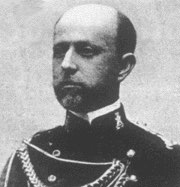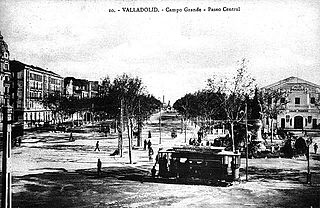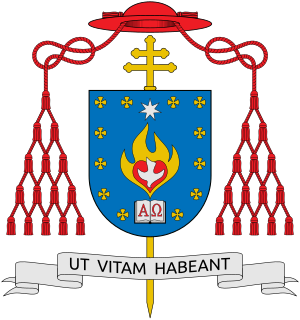
Miguel Delibes SetiénMML was a Spanish novelist, journalist and newspaper editor associated with the Generation of '36 movement. From 1975 until his death, he was a member of the Royal Spanish Academy, where he occupied chair letter "E". He studied commerce and law and began his career as a journalist. He later became the editor for the regional newspaper El Norte de Castilla before gradually devoting himself exclusively to writing novels.

Ricardo López Felipe, known simply as Ricardo, is a Spanish retired footballer who played as a goalkeeper, and is a manager.

Manuel Sanchís Martínez was a Spanish footballer who played as a defender.
Macias is a Spanish surname found to varying degrees in Europe and Latin America. Within Spain, its frequency is highest in Extremadura, followed by Andalusia, the Canary Islands and Castile and León. In Mexico, there are concentrations in Los Altos de Jalisco, Tamaulipas, and along the Texas-Mexico border.

Julio Cervera Baviera was a Spanish engineer, pioneer in the development of radio, educator, explorer, and military man. He also authored various scientific and geographic books and articles.
José María Justo Cos y Macho was a Spanish Cardinal of the Roman Catholic Church who served as Archbishop of Valladolid from 1901 until his death, and was elevated to the cardinalate in 1911.

Manuel Macías y Casado, OIC (1845–1937) was a Spanish general. He served as Governor-General of Puerto Rico during the Spanish–American War and as governor of Melilla, and occupied various other posts. Born in Teruel, Spain, Macías attended the Colegio de Infantería and became a sub-lieutenant at the age of 17. He became a lieutenant in Cuba on January 1, 1863. In December 1863 he was transferred to Santo Domingo. He was promoted to captain in March 1864. He remained in Santo Domingo until 1865.

5to Piso is the eleventh studio album by Guatemalan singer-songwriter Ricardo Arjona, released on 18 November 2008. Produced by Arjona, Jorge Amaro, Dan Warner, Lee Levin, Fernando de Santiago and Puerto Rican singer-songwriter Tommy Torres, the album was recorded in various studios between the United States and Mexico. It is the first release by the artist under Warner Music. Arjona commented that with this album, he "tried to recoup some of the freshness" of his past releases, stating that "it makes good to the songs". Jason Birchmeier from Allmusic named it "an eagerly awaited album with a phenomenal lead single." 5to Piso marks the third album in which the singer collaborates with Tommy Torres, after Adentro and Quién Dijo Ayer.
Jaime Jiménez Merlo, known simply as Jaime, is a Spanish professional footballer who plays as a goalkeeper.
Regenerationism was an intellectual and political movement in late 19th century and early 20th century Spain. It sought to make objective and scientific study of the causes of Spain's decline as a nation and to propose remedies. It is largely seen as distinct from another movement of the same time and place, the Generation of '98. While both movements shared a similar negative judgment of the course of Spain as a nation in recent times, the regenerationists sought to be objective, documentary, and scientific, while the Generation of '98 inclined more to the literary, subjective and artistic.

Juan Bautista de Acevedo y Muñoz was Bishop of Valladolid from 1601 to 1606 and Grand Inquisitor of Spain from 1603 to 1608.

Luis Garicano Gabilondo is a Spanish economist. He is currently a Professor of Economics and Strategy at the IE Business School and Vice-President of the Alliance of Liberals and Democrats for Europe.
Enrique González Casín, commonly known as Quique, is a Spanish footballer who plays for Deportivo de La Coruña as a forward.

Carlos Manuel Urzúa Macías is a Mexican Professor of Economics at the Tecnológico de Monterrey, Mexico City and Santa Fe campuses. He is a National Researcher and a member of the Mexican Academy of Science. He served as the Secretary of Finance for the Mexico City government from 2000 to 2003. He is also an award-winning poet.
Juan Núñez de Prado, illegitimate son of Infanta Blanche of Portugal and a Portuguese nobleman named Pedro Nunes Carpinteyro, was a nobleman in the 14th century who became Master of the Order of Calatrava in 1325 after leading a revolt against the former Master. There was a prolonged dispute before his position was recognized. After he fell out of favor with King Peter of Castile he was removed from office and murdered.

Trams in Valladolid was the basis of the transit system in the Spanish city of Valladolid. Trams operated in Valladolid from 1881 until 1933. Trams were not only used for passengers in Valladolid, but also for urban freight transport.

Antonio Macías del Real (1866–1939) was a Spanish writer and pharmacist that moved to Guatemala where he wrote for most prestigious cultural publications. Among his articles are those that we wrote for La Ilustración Guatemalteca during the last year of general José María Reina Barrios presidency. When the president was assassinated on 8 February 1898, Macías del Real wrote Perfiles biográficos de don Manuel Estrada Cabrera (Biographical profiles of Mr. Manuel Estrada Cabrera, who had been appointed as interim President; Macias del Real kept writing on behalf of the new president since then. In 1902 his adulation paid off, as Estrada Cabrera granted him the Pacific Railroad concession. According to Guatemalan historian Rafael Arévalo Martínez in his book ¡Ecce Pericles!, Macías del Real -a pharmacist graduated from Universidad Central de Madrid and later incorporated in Guatemala- was the one that gave Estrada Cabrera a potent venom that the latter used to get rid of his opponents.

Ricardo Casanova y Estrada " The Great" was a Guatemalan Catholic priest that became the eleventh Archbishop of Guatemala from 1886 to 1913. He had a role opposing president general Manuel Lisandro Barillas Bercián (1885-1896), who eventually expelled Casanova y Estrada from Guatemala. After a generous amnesty granted by president general José María Reina Barrios on 13 March 1897, the archbishop returned to Guatemala and was received by large crowds and joy.

Óscar Pérez Solís was a Spanish artillery officer, engineer, journalist and politician. He became attracted to left-wing causes, and left the army in 1912. He joined the Spanish Socialist Workers' Party and was its candidate in several general elections. In 1921 he was one of the founders of the Communist Party of Spain, and became secretary-general of the party. He converted to Catholicism during a period in prison in 1925–27. After being released he disavowed his left-wing beliefs and became associated with the right-wing Falangists.

Aquilino Bocos Merino, is a Spanish prelate of the Catholic Church, a member and official of the Claretians. He was Superior General of the order, properly known as the Congregation of Missionaries, Sons of the Immaculate Heart of the Blessed Virgin Mary, from 1991 to 2003. Pope Francis made him a cardinal on 28 June 2018.
















